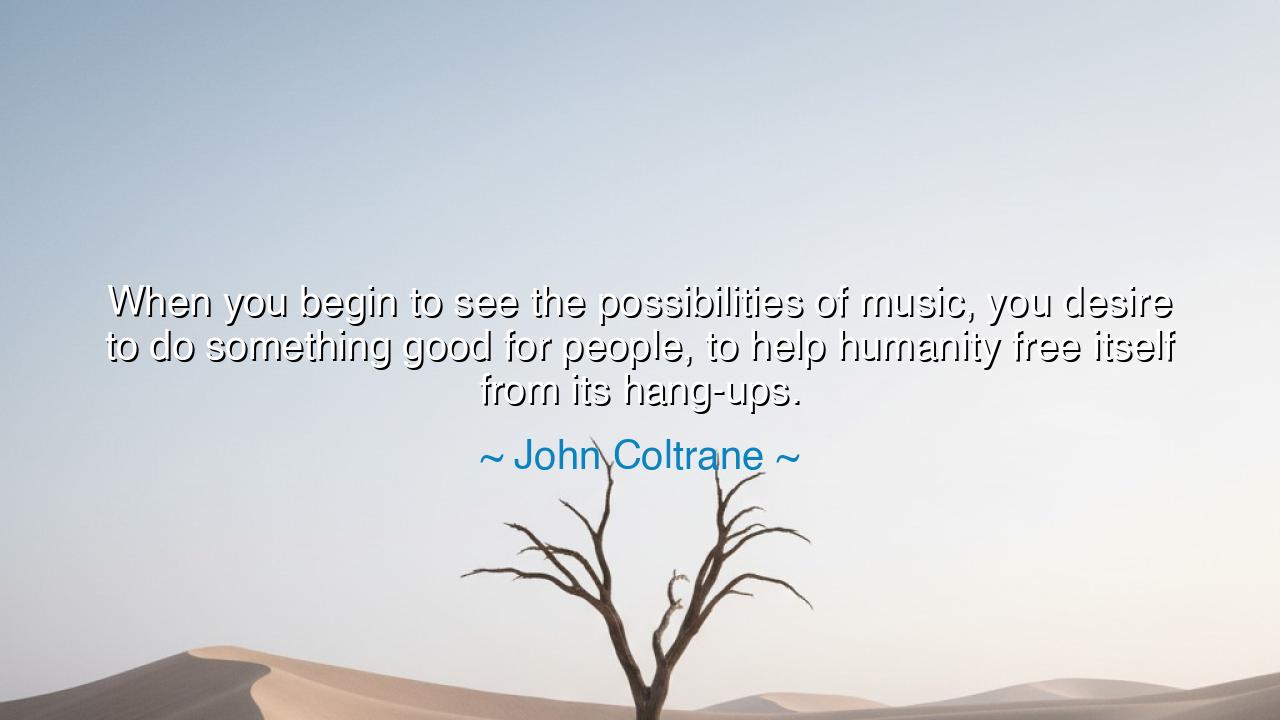
When you begin to see the possibilities of music, you desire to
When you begin to see the possibilities of music, you desire to do something good for people, to help humanity free itself from its hang-ups.






The words of John Coltrane — “When you begin to see the possibilities of music, you desire to do something good for people, to help humanity free itself from its hang-ups.” — are more than the reflections of a jazz musician; they are the voice of a prophet who saw in music the power to heal the wounds of the human soul. Coltrane’s vision was not of melody alone, but of liberation. He understood that when sound is elevated to its highest form, it becomes more than art; it becomes a force that lifts chains, breaks barriers, and leads mankind closer to freedom.
The ancients too spoke of this truth. Pythagoras, the philosopher, declared that the universe itself was woven in harmony, and that music could bring balance to the troubled mind. In the temples of old, song was not mere ornament, but ritual, a way of cleansing the heart and uniting the people with the divine. Coltrane, born in another age yet touched by the same eternal flame, saw music not as entertainment, but as a sacred path, a way of doing good for humanity, of releasing men and women from the prisons of fear, prejudice, and despair.
Consider how Coltrane himself lived this teaching. In the wake of personal struggles and the chains of addiction, he found in his own music a path to redemption. Out of suffering was born A Love Supreme, a work not simply of notes and rhythms, but of prayer, gratitude, and longing for transcendence. When he played, it was as if he were calling to humanity, saying: “Here is a sound that can lift you higher, here is a sound that can set you free.” His art was no longer about himself; it had become a gift to others, a way of healing the human condition.
History offers us another tale, in the voice of the enslaved who sang spirituals in the fields of America. These songs were born of sorrow, yet they carried the seeds of liberation. They turned pain into hope, despair into strength, and whispered of freedom even when chains still clattered. Those melodies did not only comfort the weary; they inspired generations, fueling courage in the long fight for justice. Truly, music revealed its possibility: not only to soothe, but to rouse, to awaken, to transform.
In Coltrane’s words lies also a warning: that if we see music only as entertainment, we miss its power. The artist who grasps its deeper purpose carries a sacred duty — to lift, to unite, to bring goodness into a fractured world. For humanity’s hang-ups are many: fear, hatred, division, greed. But the sound of truth, when expressed through music, can soften hearts, open minds, and inspire souls to seek higher ground.
The lesson, therefore, is clear: if you create, let your creation serve others. If you sing, let your voice be a healing one. If you play, let your instrument speak freedom. And even if you are not an artist, let the music you choose, the harmony you embrace, shape you into one who spreads kindness and hope. Coltrane teaches us that possibility must be wedded to purpose — that beauty is not complete until it becomes service.
Practical action lies before us: seek out music and art that elevate, not degrade. Fill your life with sounds that heal rather than harm. And if you are gifted to create, do so with the intention to do good for people. Let your life itself become like Coltrane’s song — a vessel of love, an offering of freedom, a melody that outlives the silence.
Thus, O seeker, remember this: the true possibility of music is not fame, nor wealth, nor applause, but the power to help humanity rise. Coltrane saw it, lived it, and gave it to the world. May you, too, let your gifts — whatever they may be — become a song of liberation, helping others free themselves from the chains that bind.






AAdministratorAdministrator
Welcome, honored guests. Please leave a comment, we will respond soon